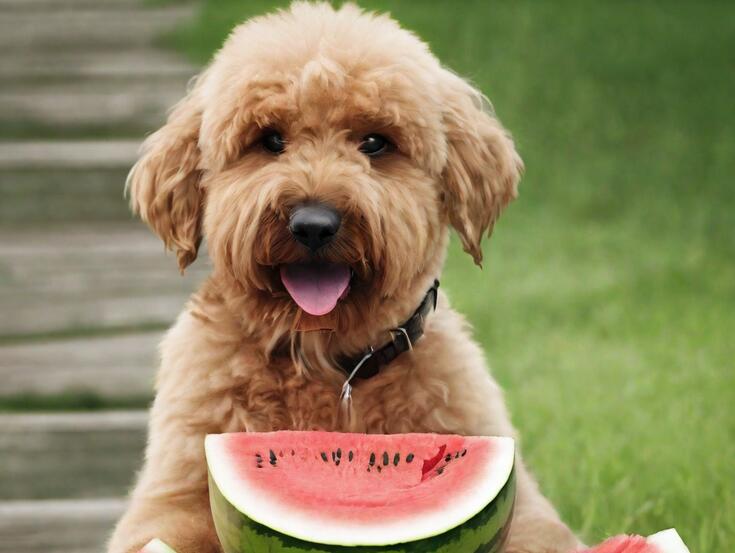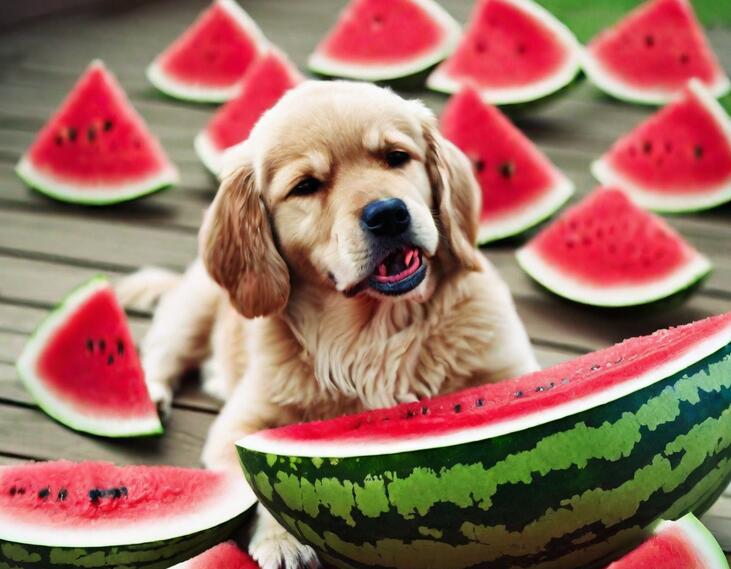Summer is prime watermelon season. As you enjoy this refreshing, juicy fruit, it’s natural to want to share a slice with your furry friend. But is it safe? Can dogs eat watermelon? The short answer is yes, dogs can eat watermelon in moderation. Watermelon has a high water content plus nutrients like vitamins A, C, and B6. It can be a tasty treat during the hot summer months.
Table of Contents
ToggleHowever, there are some risks and precautions to consider before feeding watermelon to dogs. Too much can cause gastrointestinal upset. Make sure to introduce new foods slowly and monitor your dog’s reaction. This article will explore the benefits and risks of watermelon for dogs.
Is Watermelon Safe For Dogs?
The short answer is yes, watermelon is safe for dogs to eat in moderation. Watermelon contains vitamins, minerals, and antioxidants that can benefit your dog’s health. Most dogs enjoy the sweet taste of watermelon flesh.
However, while the flesh of the watermelon is fine for dogs, you should avoid feeding dogs the rind or seeds. The tough rind is difficult to digest and can potentially cause an intestinal blockage. The seeds can also cause digestive upset or blockage.
It’s important to introduce new foods like watermelon slowly and in small quantities. Feed only a few cubes at first to make sure your dog tolerates it well. Also, be cautious feeding watermelon to puppies or dogs with sensitive stomachs.
As with any treat, feed watermelon in moderation. Too much can lead to digestive upset and diarrhea. A few cubes or slices a couple times a week is a nice refreshing treat.

Health Benefits Of Watermelon For Dogs
There are several nutritional benefits that make watermelon a healthy snack choice for dogs:
- Hydration – With about 92% water content, watermelon helps keep dogs hydrated and is especially useful on hot summer days. All that water content helps replenish fluids.
- Vitamin A – Watermelon contains decent levels of vitamin A, an important nutrient for eye and skin health in dogs. Vitamin A helps maintain healthy vision.
- Vitamin C – This fruit also provides vitamin C, an antioxidant that supports immune function and collagen production. Vitamin C may benefit skin, joints, and immune defenses.
- Potassium – Watermelon has high potassium content. Potassium helps regulate fluid levels and benefits muscle and nerve activity.
- Lycopene – Watermelon has this antioxidant compound thought to reduce inflammation and oxidative damage. Lycopene may promote heart health in dogs.
- Fiber – The flesh provides a small amount of fiber to support regular digestion and healthy stool consistency. The water content also helps maintain regularity.
In addition to vitamins, minerals, and antioxidants, watermelon is low in calories, fat, and sodium. It makes a nutritious treat that hydrates your dog and provides beneficial nutrients without excess calories.
How to feed your dog watermelon?
If you’ve determined that your pup is of appropriate age and health to try watermelon based on the guidelines above, here are some tips for safe preparation and feeding:
Select Watermelon: Choose seedless varieties when possible for convenience. Alternatively, a seeded melon requires extra deseeding time.
Wash and Deseed: Rinse exterior of melon thoroughly before cutting. Use a spoon to scrape out flesh and check carefully for any seeds embedded within.
Slice or Dice: Cut watermelon into bite-sized sticks, cubes, or balls no larger than 1/2 inch wide to reduce choking risk.
Remove Rind: Using a butter knife or vegetable peeler, carefully remove and discard all tough green rind from pieces.
Portion Control: Only provide recommended amount based on your dog’s weight and never leave a full bowl unattended.
Supervise Snacking: Watch your pup when first enjoying watermelon in case they try to eat too fast. Gently pace them.
Serve Outside: Offer watermelon on a lawn or during walks to avoid messes indoors if juice dribbles!
Reinforce Manners: Reward calm snacking with encouraging praise to maintain your dog’s good table behavior on new foods.
Monitor and Enjoy Together: Stay nearby during and after to ensure tolerance with no vomiting, diarrhea or other issues developing.
How Much Watermelon Should I Feed My Dog?
When feeding watermelon, moderation is key. While watermelon is safe for dogs, too much can lead to gastrointestinal upset, diarrhea, and even vomiting.
Start by introducing just a few cubes or slices of watermelon as a treat. See how your dog reacts to the new treat before increasing the amount.
For a larger dog, a few slices or about 1 cup diced watermelon pieces is an appropriate serving. Small dogs should only have a few small cubes at a time.
You can offer watermelon a few times per week as an occasional treat. But don’t let your dog overindulge in large quantities all at once. Too much can cause excess sugar and fluid intake, leading to digestive issues.
Also, be sure to account for the watermelon’s sugar content in your dog’s overall diet. The natural sugars shouldn’t be a problem in moderation, but can contribute to weight gain if overfed. Talk to your vet if you have any concerns about the fruits or sugars you feed your dog.
Should You Feed Dogs Seedless Watermelon?
Many people wonder if seedless watermelon is better or safer to feed dogs. Both regular and seedless watermelon are fine for dogs.
Seedless varieties simply have undeveloped seeds that are soft and entirely edible. So while seedless watermelon may be more convenient since you don’t have to remove seeds, it’s not necessarily safer or better. The flesh of both types still has the same nutritional value.
When feeding seedless watermelon, it’s still a good idea to visually inspect it and remove any pieces of rind. But you don’t have to be concerned about finding and taking out all the mature, hard black seeds.
At the end of the day, both varieties are safe for dogs as an occasional treat in moderation. Focus on choosing fresh, ripe watermelon and keeping serving sizes small.
Can Dogs Eat Watermelon Rind?
While the sweet red flesh of watermelon is safe and healthy for dogs, the tough green rind should always be avoided. Here’s why:
- Watermelon rind is difficult for dogs to digest due to its dense fiber content.
- Undigested rind can cause intestinal blockages or impaction.
- Rinds also provide no nutritional value for dogs.
- Some dogs may try to eat the rind, but it should not comprise part of their diet.
For safety, it’s best to remove all rind thoroughly before feeding any watermelon pieces to dogs. While they may enjoy chewing on it, the risks outweigh the benefits. Proper de-rinding is an important step when preparing this summer treat.
So in conclusion, dogs should not be given watermelon rind due to its low digestibility and blockage risks. Only the seeded and de-rinded flesh is suitable as an occasional snack.
Can Puppies Eat Watermelon?
Most puppies can enjoy small amounts of watermelon flesh as an occasional treat. But as always, introduce new foods slowly and carefully watch your puppy’s reaction.
Make sure to peel off the rind and remove any seeds. Cut the watermelon into small cubes appropriate for your puppy’s size. Start with just 1-2 cubes at first to see if any digestive upsets occur.
If your puppy seems to tolerate it well, you can gradually increase the amount over a period of days or weeks. But don’t overdo it, as too much can cause diarrhea in puppies. It’s also easy for a puppy to eat pieces that are too large and choke.
Because of their small size, watch puppies closely when feeding watermelon. Make sure to cut it into properly sized pieces before feeding. Also consider holding the pieces while your puppy gently licks/chews the watermelon, rather than letting them gulp it down.
Check with your veterinarian if you have any concerns about feeding watermelon or other fruits to your puppy. They can advise you based on your puppy’s size, breed, and health status.
Can Dogs Eat Frozen Watermelon?
Yes, frozen watermelon makes a tasty cold treat for dogs on hot days. Freezing doesn’t change the nutritional value or safety of watermelon for dogs.
To prepare frozen watermelon treats:
- Peel off rind and remove seeds
- Cut into cubes or slices
- Place in freezer in a sealed container or bag
Let the pieces partially thaw before feeding to prevent injury to your dog’s mouth and teeth. Fully frozen pieces could cause fractured teeth if your dog tries to bite into them.
Monitor your dog when feeding any frozen treats. The hard texture can present a choking hazard for aggressive chewers. As always, supervise your dog and feed frozen watermelon in moderation.
Can dogs eat watermelon seeds or pips?
While watermelon flesh is safe and healthy for dogs in moderation, the seeds or pips should always be avoided. Here’s a breakdown:
- Watermelon seeds, also called pips, pass through the digestive tract undigested.
- This poses a choking and intestinal blockage risk if consumed, even in small quantities.
- The seeds themselves are not toxic, but can cause serious foreign body obstruction.
- Both seedless and seeded varieties may still contain some small seeds embedded in flesh.
- It’s not worth the risk, so complete deseeding of watermelon pieces is recommended.
For these safety reasons, it’s best not to let dogs eat any part of the watermelon containing seeds, rinds or pith – no matter how eager they seem. Always thoroughly inspect and remove all seeds prior to offering treats. Their well-being should come before any temporary enjoyment of the less digestible parts.
Watermelon Treats for Dogs
In addition to slices or cubes of fresh watermelon, you can also make special watermelon dog treats. Here are some ideas:
Watermelon Ice Cubes – Freeze small cubes of seedless watermelon flesh in an ice cube tray. Great for teething pups or hot summer days.
Watermelon Dog Ice Cream – Blend frozen watermelon chunks in a food processor until smooth. Scoop into small bowls for a cool puppy popsicle!
Watermelon Doggy Pops – Hollow out watermelon balls, fill with peanut butter or yogurt, and refreeze for a fun handheld snack.
Watermelon Cookie Cutters – Use fun shaped cutters to stamp out de-seeded rounds, then partially freeze for dogs to lick and chew.
Watermelon Rice Cakes – Mash watermelon and mix with a small amount of plain rice cereal. Form into patties and bake at 350°F until dry.
Always supervise treats and never leave more than portions specified. They make hydrating watermelon even more enjoyable for furry friends!
Watch for Signs of Intolerance
Introducing any new food comes with potential risks including mild to severe allergic reactions, intolerance or gastrointestinal upset in some dogs. When beginning watermelon or limited snacks, always supervise and watch your pup closely for signs that may indicate their stomach is not handling it well:
- Vomiting or diarrhea within a few hours
- Stomach gurgling or visible discomfort
- Loss of appetite or refusing regular meals
- Excess drooling, lethargy or sluggish activity levels
If any or a combination persists longer than a day, it’s best to avoid further watermelon snacks until consulting with your vet to rule out issues like food sensitivities, allergies or other underlying conditions. Safety comes first.
The Bottom Line
- Dogs can eat and enjoy seedless watermelon flesh in moderation as a healthy low-calorie snack and way to stay hydrated.
- Always remove rind and seeds before feeding to avoid potential digestive issues.
- Watch portion sizes based on your dog’s size – about 1 cup diced is a good guideline for medium dogs.
- Introduce watermelon slowly and monitor for intolerance signs like diarrhea or loss of appetite.
- Don’t replace a balanced diet with excessive watermelon snacks.
- Puppies, toy or small breed dogs may need extra precautions or smaller portions.
- If concerned, ask your vet about introducing fruits safely for your individual dog.





